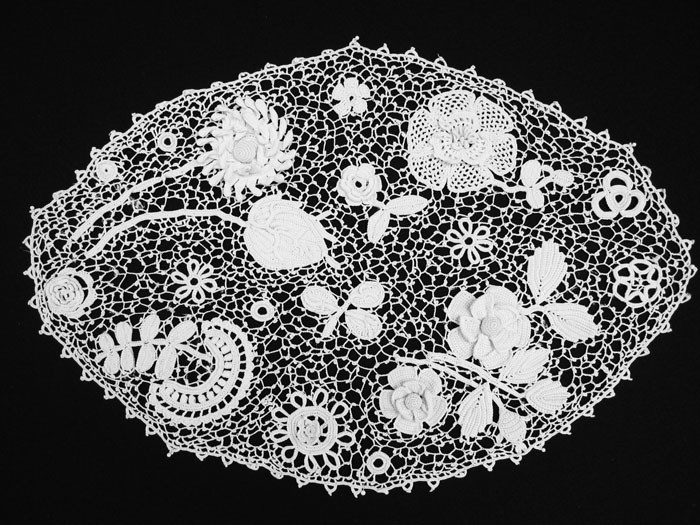Lace and linens represented many things to many people over the years. Such a fabric of history still holds a special place in homes today.
“It’s very special,” said Pauline Pierre, guest curator of an exhibit devoted exclusively to the fashion and its craft at Auburn’s White River Valley Museum. “Today there isn’t the value that was attached to lace historically. Back then, lace was considered as valuable as gold and jewelry. … It was an asset … passed on as heirlooms by families.
“The beauty of lace is awesome, not unlike a delicate spiderweb,” said Pierre, a member of the International Old Lacers, Inc. (IOLI) and Lace Arts Council for Education (LACE). “This feeling has driven me to learn about lace and how to make it.”
Household lace is flaunted in many ways – from hand-stitched cocktail napkins to coasters, show towels to tablecloths, doilies to pillow cases, bedcovers to crib skirts, chair coverings to mats.
Such a variety of special-crafted lace items is on display now through Aug. 1 at the museum. “Household Lace Adds Charm to Your Place: An Exhibit of Historic Bed, Bath, Table and Kitchen Lace” – a collection made possible through the generosity of others devoted to the subject – honors the art and history of making lace.
Although lace has a place in fashion history, it was used for centuries throughout the world in many capacities. Lace not only trimmed household linens, it decorated furniture and adorned church altars.
“Historically, lace in the home often added more than charm. It also hinted at the homeowner’s place in society,” said, Patricia Cosgrove museum director.
The technique used to make the lace, the level of intricacy in the design and even the region where the lace was made spoke volumes for the homes of nobility, Cosgrove said.
Similar to quilting, lace-making has its roots in women’s history, she said. Once considered a secret trade of nuns, lace-making evolved in women’s history when it became a way for maidens to make an acceptable living.
“There was a physical embodiment of love and respect when these (items) were made for a family,” Cosgrove said. “They were brought out for family events or to adorn the household. I find myself in awe over that.”
Lace has family roots that span generations. Some of the lace items on display at the museum can be traced to the 1800s and 1900s. Some original strips of lace reach even further back in history.
“It was a treasure. It certainly was handed down and reused,” Cosgrove said.
Nancy Evans, a guest curator, hopes others will come away impressed by the uniqueness, condition and character of the lace exhibit.
“Hopefully they will be more aware of how special these items were at the time,” said Evans, a devoted student, teacher and consultant of lace.
Lace is by no means a lost art. Clubs, collectors and hobby groups still study and practice the craft today.
“But it’s not an industry,” Evans pointed out. “There are few lace machine-makers today.”
Which makes lace even more special to those who appreciate a fabric of history.
ON DISPLAY
• KeyBank Gallery: “Household Lace Adds Charm to Your Place” – an exhibit of historic bed, bath, table and kitchen lace Textiles. On display until Aug. 1.
• Venue: White River Valley Museum, 918 H St. SE, Auburn.
• Hours: Open Wednesday-Sunday, noon to 4 p.m.
• Admission: $2 adults, $1 seniors/children; free on Wednesdays and the fourth Sunday of the month.
• Information: 253-288-7433, www.wrvmuseum.org.
• Sponsors: International Old Lacers, Inc. (IOLI) and the Lace Arts Council for Education (LACE). The exhibit is timed to coincide with the 57th IOLI Convention, “Cascades of Lace,” July 25-31 in Portland. LACE members Nancy Evans and Pauline Pierre are the exhibit’s guest curators.
• Seminar: Home Care for Your Household Linens, July 10, 1 to 4 p.m.
Nancy Evans will lead a hands-on seminar about caring for lace and linens at home. Learn practical tips on stain removal, tear repair and how to block and pin a doily. Participants are encouraged to bring pieces from home for consultation. $15 per person, pre-registration required. Call 253-288-7439.


